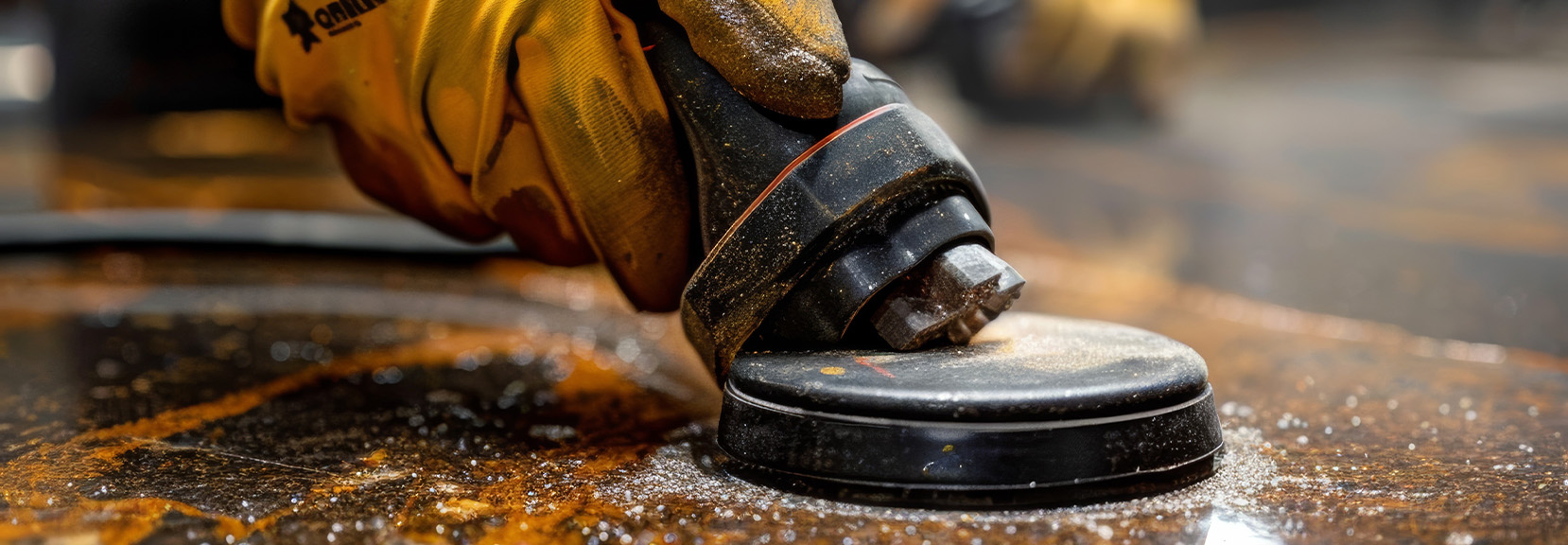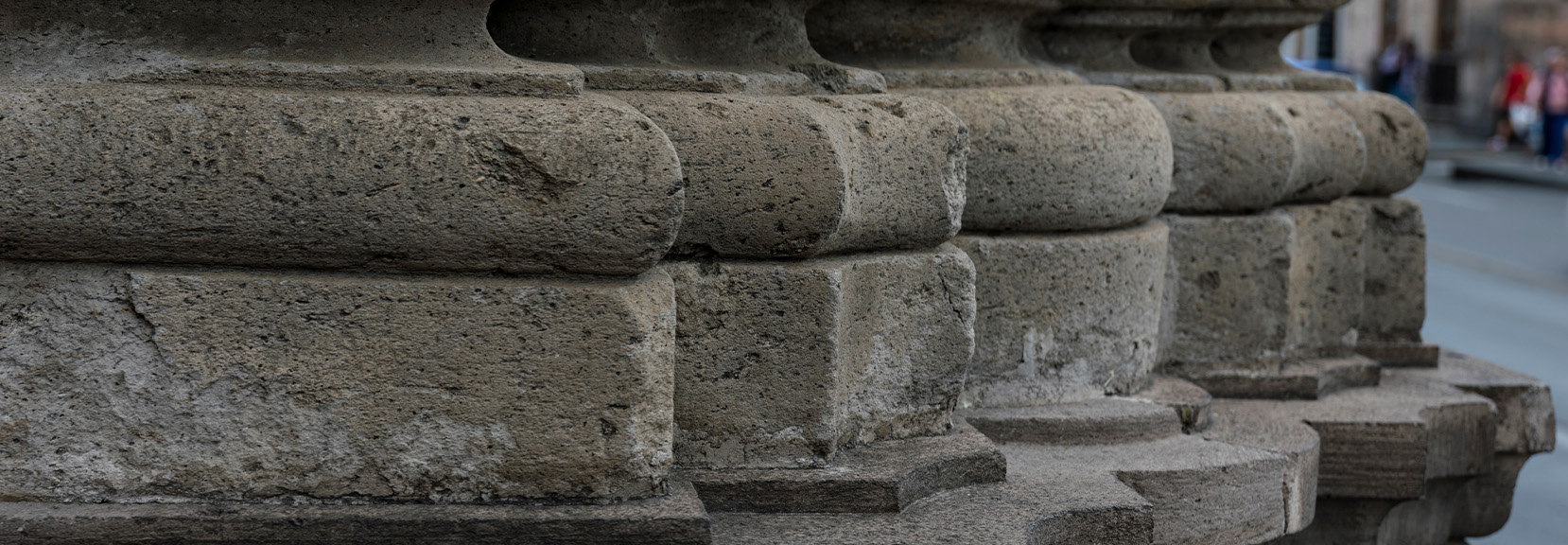At Your Fingertips
A Wealth
of information
For stone and tile restoration contractors
and others interested in the subject.
Decades of experience and collection of resources Have gone into the Manual...
And I’m now sharing it and making it available to fellow stone and tile restoration pros at no cost. No strings attached. Just register for free and you can immediately access all the highly relevant chapters and resources.
Once you’re registered you will have access to the content via interactive online documents or you can print the PDFs, keep them in a 3-ring binder, and build your own ever-growing reference manual. And when new material is added, you’ll be notified.
Enjoy!
–Fred Hueston

WHAT'S IN the manual?
A priceless resource for the stone and tile restoration contractor that includes a wealth of information, how-tos, reference charts, plus sample contracts, editable forms, and more.
Chapters:
Geology and Stone Identification
In this chapter, you’ll explore the fascinating rock cycle, understand different stone types, and master mineral identification. Learn about the various uses of marble beyond the conventional, gain skills in field identification of stones, and discover the intriguing “Name Game” of stone nomenclature. Finally, access additional resources and tips for further stone identification assistance.
Quarrying and Fabrication
In the chapter on Quarrying and Fabrication tailored for the Stone Restoration Contractor, you’ll embark on a comprehensive journey beginning with an introduction to quarrying processes. Understand the intricate methods involved in extracting stone from the earth, setting the foundation for how raw materials are transformed into the stunning surfaces we see. The chapter progresses to provide a detailed listing and location of quarries worldwide, offering valuable insights into the origins of various stone types and their unique properties. Finally, delve into the specialized area of stone fabrication for restoration contractors, learning the skills and techniques necessary to modify, repair, and restore stone to its original beauty. This chapter equips stone restoration professionals with essential knowledge on the source and preparation of stone, enabling them to make informed decisions in their restoration projects.
Chemistry
In this chapter, we embark on a journey through the chemistry of stone cleaning and polishing, laying the foundational knowledge of cleaning chemistry before diving into the specifics of how stone cleaners work. Highlighting the role of nanotechnology, we explore its groundbreaking impact on the enhancement of cleaner and sealer performances, offering deeper protection and durability for various stone types. This section not only demystifies the science behind the effective removal of stains and preservation of stone surfaces but also introduces the latest advancements in stone cleaning chemistry. These innovations promise safer, more environmentally friendly solutions and hint at a future where stone restoration is revolutionized by sustainable practices and cutting-edge technology, ensuring the natural beauty and longevity of stone materials are maintained with unprecedented precision and care.
Stain Management
In this chapter, we delve into the intricate process of stain management for stone surfaces, providing a comprehensive guide on how to tackle various types of stains through effective techniques and professional insights. Beginning with an introduction to poulticing—a method used to draw out stains from porous materials—we explore the characteristics of different stain types and the specific approaches required to address them. This chapter is packed with professional tips for stain removal, offering practical advice on how to identify and treat stains from organic sources, oil-based spills, metal marks, and more, ensuring the preservation of the stone’s natural beauty. Whether you’re facing challenges with stubborn stains or seeking to prevent future discoloration, this chapter equips you with the knowledge and skills necessary to maintain and restore the elegance of stone surfaces with confidence and expertise.
Stone Restoration
In this comprehensive chapter on “Stone Restoration,” you’ll delve into the specialized world of stone restoration, gaining a deep understanding of the nuanced approaches required for different stone types, including granite, marble, limestone, and more. This chapter breaks down the restoration process into detailed, step-by-step procedures, starting with the initial assessment of the stone’s condition, to the selection of the correct cleaning methods, and the application of specific restoration techniques tailored to each stone type. For granite, you’ll learn about its unique properties that demand specific polishing and sealing techniques to enhance its durability and shine. When it comes to marble, the focus shifts to gentle cleaning methods and special attention to etch removal and surface polishing to preserve its natural luster. Limestone restoration is discussed in the context of addressing its porosity and susceptibility to erosion, highlighting the importance of protective treatments. Additionally, the chapter covers the tools, materials, and safety measures essential for effective restoration work, alongside tips for achieving seamless finishes on a variety of other stone types. By mastering these detailed procedures, you’ll be equipped to restore the beauty and integrity of even the most challenging stone surfaces, ensuring your craftsmanship stands the test of time.
Sealing and Protecting
In the surprisingly enlightening chapter on “Sealing Stone Surfaces,” you will uncover the critical distinctions between coatings and impregnators, and delve into the diverse types of impregnators, to ensure the longevity and beauty of stone surfaces. This chapter provides an in-depth analysis of how coatings, which act as a protective layer on the surface, compare with impregnators that penetrate the stone to protect it from within, thereby preserving its natural appearance and texture. You’ll learn about the various types of impregnators available, including water-based and solvent-based options, and how their application varies depending on the stone type, location, and exposure to elements. The chapter further explores suitable scenarios for each sealing method, guiding you on where and why to use them, whether it’s for interior elegance or withstanding outdoor environments. Additionally, it addresses the importance of breathability in sealed surfaces, preventing moisture buildup that can lead to damage. By the end of this chapter, you’ll have a comprehensive understanding of the best practices for selecting and applying sealants, ensuring the effective protection and maintenance of stone surfaces in any setting.
Problem Solving and Troubleshooting
In “Problem Solving and Troubleshooting,” we embark on a detailed exploration of the common challenges and pitfalls encountered in the stone restoration process, equipping you with the knowledge and techniques to address them effectively. This chapter is meticulously crafted to enhance your problem-solving skills, covering a wide range of scenarios from identifying the root causes of deterioration and damage to selecting the appropriate restoration methods for various stone types. You’ll learn about the latest techniques and innovative solutions for tackling complex restoration challenges, including stain removal, crack repair, and maintaining the integrity of historical stone structures. Furthermore, this chapter emphasizes the importance of preventive measures and regular maintenance to avoid potential problems, offering practical tips for educating your clients on the long-term care of restored surfaces. By the end of this chapter, you’ll be adept at diagnosing and resolving stone restoration issues, ensuring the longevity and beauty of stone surfaces while reinforcing your reputation as a skilled and reliable professional in the field.
Safety
In the vital chapter, we delve into the essential practices and equipment needed to ensure the well-being of both the professionals involved and their clients. This section is meticulously designed to cover the full spectrum of personal protective equipment (PPE) necessary for safe stone restoration work, including the use of respirators, safety glasses, gloves, and protective clothing to guard against the inhalation of dust, contact with harsh chemicals, and other physical hazards. The chapter goes beyond just listing the needed gear, providing insightful explanations on the correct use and maintenance of each piece of equipment. Moreover, it emphasizes the importance of creating a safe working environment through proper ventilation, hazard communication, and the implementation of a comprehensive safety plan tailored to the unique risks of the stone restoration industry. Through real-world examples and expert advice, this chapter aims to instill a culture of safety that prioritizes health while maintaining efficiency and effectiveness in restoration projects, ensuring that practitioners can deliver high-quality results without compromising on safety standards for themselves and their clients.
Equipment and Supplies
In this chapter on equipment and supplies for stone and tile restoration, we dive into the essential tools and materials required to breathe new life into stone and tile floors and surfaces. From sophisticated machinery like the planetary head grinder, which offers unparalleled precision in grinding and polishing, to a comprehensive checklist of supplies including diamond abrasive pads for various stages of sanding, polishing powders tailored to different stone types, sealers for long-lasting protection, and repair materials such as epoxy or polyester resins for fixing cracks and chips. We also cover the importance of safety gear, cleaning solutions, and hand tools for detail work. This chapter is designed to equip you with a thorough understanding of each component’s role in the restoration process, ensuring you have everything at your disposal to achieve a professionally finished floor or surface.
Maintenance
In the chapter on Stone Maintenance, readers will embark on a comprehensive journey through the meticulous world of caring for stone surfaces. This chapter will introduce an array of cleaning chemicals, detailing their compositions, uses, and the specific types of stone they are best suited for. It will guide you through the proper maintenance procedures, step-by-step, to ensure the stone remains in pristine condition. From daily cleaning routines to more intensive care strategies, the chapter covers everything needed to keep stone surfaces shiny and looking new. Additionally, it will offer invaluable insights into the do’s and don’ts of stone maintenance, helping professionals and their clients avoid common pitfalls and adopt best practices for long-lasting beauty and durability of stone features.
Stone Field Repairs
In this chapter, “Stone Field Repairs,” readers will delve into the intricate world of stone restoration, focusing on the pivotal role of adhesives, their diverse types, and mechanisms of action. This comprehensive guide illuminates the step-by-step procedures for repairing stone, emphasizing the critical aspect of color matching to ensure seamless restorations. From epoxy resins known for their robust bond strength and durability in outdoor environments to polyester resins preferred for their quick setting times and ease of color blending, the chapter equips professionals with the knowledge to select the right glue for various types of stone and repair scenarios. Additionally, it provides valuable tips and tricks gleaned from experienced practitioners, including how to prepare the stone surface for repair, effectively mix and apply adhesives, and use tinting agents to achieve a perfect match with the original stone. This chapter is designed to elevate the skill set of professionals in the field, offering insights into the latest repair techniques and innovations for achieving aesthetically pleasing and long-lasting results.
Slip and Fall
In the critical chapter titled “Slip and Fall,” you will embark on a detailed exploration of preventative measures, response strategies, and legal protections concerning slip and fall incidents on stone floors. This chapter equips you with the knowledge to significantly reduce the risk of accidents through various methods, including the application of non-slip treatments and finishes, and the proper maintenance practices that ensure stone floors remain safe underfoot. You’ll learn how to effectively respond to slip and fall accidents, from immediate first aid to documenting incidents accurately, which is essential for both aiding the victim and protecting your business. Additionally, the chapter delves into the legal aspects of slip and fall claims, offering guidance on how to navigate potential lawsuits with a focus on risk management strategies, such as liability insurance and implementing a comprehensive safety protocol. Furthermore, you’ll be introduced to the latest in slip-fall testing and equipment, enabling you to conduct regular assessments of floor safety and adhere to industry standards. This chapter is an indispensable resource for any stone restoration professional, providing the tools and insights needed to create safer environments and shield your business from the repercussions of slip-and-fall incidents.
All About Grout
In this chapter, we delve deep into the world of grout, an essential yet often overlooked component of tile work. Starting with a comprehensive overview of grout types, we guide you through the practical skills needed to identify different grout materials, crucial for effective maintenance and troubleshooting. This chapter not only equips you with the knowledge to distinguish between sanded, unsanded, epoxy, and other grout varieties but also offers step-by-step procedures for cleaning, sealing, and color sealing, ensuring the grout remains in pristine condition. Furthermore, we address common grout issues, providing proven strategies for troubleshooting and detailed instructions for repairs. This chapter is designed to enhance your understanding of grout’s functionality and aesthetics, empowering you to achieve durable and visually appealing tile surfaces.
Pricing and Contracts
In the chapter on “Pricing and Contracts,” we address the critical aspect of setting competitive and profitable price points for your services. This segment is meticulously designed to guide you through the complexities of pricing strategies in the stone and tile restoration industry, ensuring you understand how to accurately calculate your costs, assess market demand, and analyze competitor pricing. You’ll gain insights into various pricing models, such as cost-plus, value-based, and dynamic pricing, and how to apply them effectively in your business context. Moreover, the chapter emphasizes the importance of transparent communication with your clients regarding pricing, helping you build trust and establish long-term relationships. By equipping you with the tools and knowledge to develop a comprehensive pricing strategy, this chapter aims to enhance your profitability while maintaining competitiveness in the market, ensuring you can provide exceptional quality services without compromising on your business’s financial health.
Headstone Cleaning and Restoration
The Headstone Cleaning and Restoration chapter provides stone restoration professionals with detailed guidance on the proper care, cleaning, and restoration of headstones, monuments, and mausoleums. It covers the identification of common stone types used in these memorials, such as granite, marble, and limestone, and the appropriate cleaning techniques for each. The chapter emphasizes the importance of using gentle methods to avoid damaging historic or delicate stone surfaces, addresses common restoration challenges like biological growth, stains, and weathering, and offers solutions for maintaining the long-term appearance and integrity of these important memorials.
Historic Stone Preservation
The Historic Stone Restoration chapter focuses on the specialized techniques and considerations involved in preserving and restoring historic interior stone and tile surfaces. It covers the importance of adhering to the Secretary of the Interior’s Standards for Rehabilitation, which guide the preservation of the original materials and architectural integrity of historic structures. The chapter provides insights into appropriate cleaning, repair, and polishing methods, emphasizing the use of gentle, historically accurate techniques. It also addresses the challenges of maintaining the character of aging stone while ensuring long-term durability, helping stone restoration professionals navigate the balance between conservation and modern restoration practices.
Quartz Surfaces Repair and Restoration
The Quartz Surfaces Repair and Restoration chapter provides a comprehensive guide for stone restoration professionals on working with quartz, also known as engineered stone. It covers the composition and unique properties of quartz, including its durability, non-porous nature, and heat sensitivity. The chapter addresses common issues like scratches, stains, and chips, and offers techniques for effective repair and polishing. It also includes guidance on identifying quartz surfaces, using specialized tools, and understanding the differences between quartz and natural stone to ensure successful restoration while maintaining the material’s integrity.
Marketing and Managing Your Business
In the chapter on marketing and managing your stone and tile restoration business, you will embark on a comprehensive journey that covers the pivotal strategies and practical tools needed to elevate your business to new heights. This chapter is designed to offer a deep dive into the essentials of developing an effective marketing plan, tailored to the unique challenges of the stone restoration industry. You will learn how to effectively identify and target your ideal customer base, leveraging both traditional and digital marketing channels to maximize your reach and impact. Additionally, the chapter will provide valuable insights into the art of crafting compelling messaging that resonates with your audience, encouraging engagement and fostering loyalty. On the management side, we’ll explore essential techniques and tools for optimizing operational efficiency, from streamlining processes and managing inventory to nurturing a motivated and skilled team. By integrating these marketing and management principles, you will be equipped with the knowledge to not only attract more clients but also deliver exceptional service, ensuring the long-term success and sustainability of your restoration business.
Disaster Restoration
Acquiring expertise in restoring stone damaged under emergency or disaster conditions can unlock a host of new opportunities for the stone restoration contractor. This chapter deep dives into the most common types of disasters – flood, fire, crime scene, vandalism, and chemical spills – and guides you on how to manage the ins and outs of restoration, dealing with insurance companies, and more.




THE STONE DETECTIVE
February 11, 2026
The Stone That Doesn’t Like Cold

Recent Blog Posts
stay informed
Be notified of News and Updates
Want to always be among the first to know about new content, news, events, webinars, and workshops for those in the stone and tile care industry? Submit your name and email address. We respect your privacy and won’t share your info…
Get listed in our resource directory.




